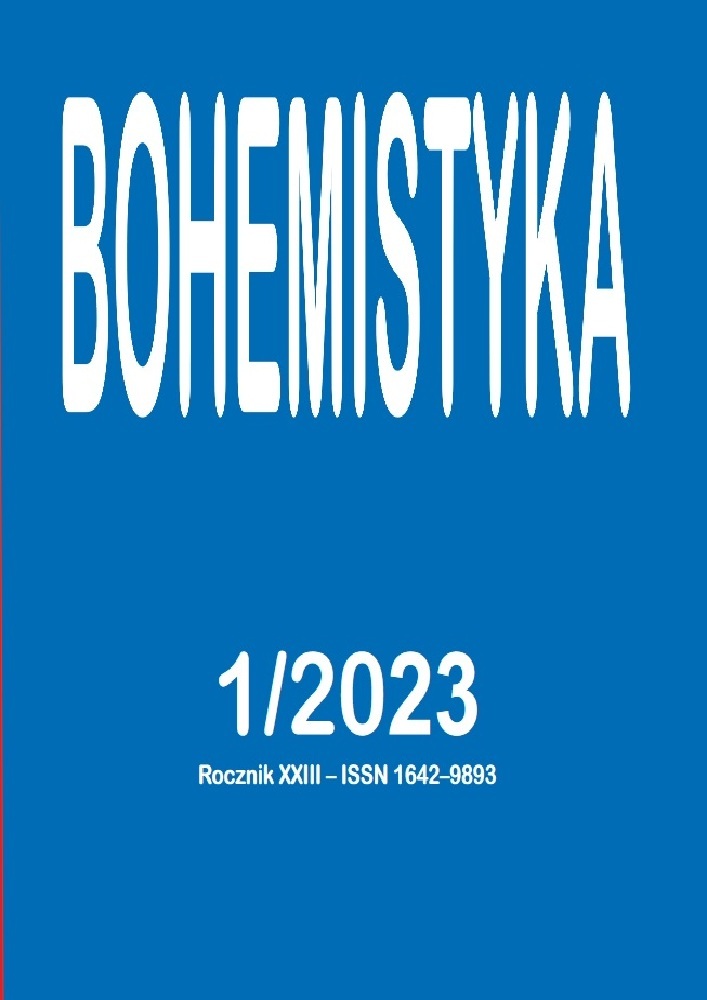Abstrakt
The paper deals with the functioning of if-clauses in mathematical word problems and with their equivalents. First, the nature of a word problem as a text type is shown. Further, the difference between complex sentences with proper implicative-causal relation and a lay use of conditional clauses is examined. As its main goal, the paper presents a comparison of various instances of conditional clauses in mathematics word problems. Also, it shows the role of formulaic stereotypy and conventional assumptions in word problem texts as an integral part of both the mathematical and the communicative competence.
Bibliografia
Abedi, J. & Lord, C., 2001, The language factor in mathematics tests. Applied Measurement in Education, 14(3), 219–234. DOI: https://doi.org/10.1207/S15324818AME1403_2
Bakhtin, M. M., 1986, Speech genres and other late essays. C. Emerson & M. Holquist (eds.), transl. V. W. McGee. Austin: University of Texas Press.
Bassok, M., 2001, Semantic alignments in mathematical word problems. In Centner, D., Holyoak, K. J. & Kokinov, B. N. (eds.), The analogical mind: Perspectives from cognitive science, 401–433. Cambridge, Massachusetts: The MIT Press.
Bergqvist, E., Theens, F. & Österholm, M., 2018, The role of linguistic features when reading and solving mathematics tasks in different languages. Journal of Mathematical Behavior, 51, 41–55. DOI: https://doi.org/10.1016/j.jmathb.2018.06.009
Bovenmyer Lewis, A. & Mayer, R. E., 1987, Students’ miscomprehension of relational statements in arithmetic word problems. Journal of Educational Psychology, 79/4, 363–371.
Cummins, D. et al., 1988, The role of understanding in solving word problems. Cognitive Psychology, 20(4), 405–438. DOI: https://doi.org/10.1016/0010-0285(88)90011-4
Daroczy, G., Wolska, M., Meurers, W. D. & Nuerk, H. C., 2015, Word problems: a review of linguistic and numerical factors contributing to their difficulty. Frontiers in Psychology, 6(348), 22–34. DOI: https://doi.org/10.3389/fpsyg.2015.00348
Davidson, D., 1967, Causal Relations. The Journal of Philosophy 64/21, 691–703. DOI: https://doi.org/10.2307/2023853
Engel, U., 1996, Deutsche Grammatik. Heidelberg: Julius Groos.
Dijk, T. A. van, 1973, Text grammar and text logic. In: J.S. Petöfi and H. Rieser (eds.), Studies in text grammar. Dordrecht: Reidel, 17–78. DOI: https://doi.org/10.1007/978-94-010-2636-9_2
Durand-GuerrIer, V., 2003, Which notion of implication is the right one? From logical considerations to a didactic perspective. Educational Studies in Mathematics, 53(1), 5–34. DOI: https://doi.org/10.1023/A:1024661004375
Ferguson, Ch. A., 1994, Dialect, register, and genre. Working assumptions about conventialization. In: D. Biber & E. Finegan (eds.), Sociolinguistic perspectives on genre. Oxford: OUP, 15–30.
Geis, M. L. & Zwicky, A. M., 1971, On invited inferences. Linguistic Inquiry 2, 561–566.
Grice, H. P., 1975, Logic and conversation. In P. Cole – J.L. Morgan (eds.), Syntax and Semantics 3. New York: Academic Press, 41–58. DOI: https://doi.org/10.1163/9789004368811_003
Hembree, R., 1992, Experiments and relational studies in problem solving: A meta-analysis. Journal for Research in Mathematics Education, 23(3), 242–273. DOI: https://doi.org/10.5951/jresematheduc.23.3.0242
Hirschová, M., Matematická slovní úloha jako komunikát. Český jazyk a literatura, 68(2), 69–75.
Karlík, P., 1995, Studie o českém souvětí. Brno: Masarykova Univerzita.
Karlík, P., 2016, Příslovečné určení podmínky. In: P. Karlík, M. Nekula, J. Pleskalová (eds.), Nový encyklopedický slovník češtiny. Praha: NLN, 1495–1499.
Kotyra, D. & Sivošová, A., 1997, Jak se naučím řešit slovní úlohy z matematiky? Praha: Educo.
Leech, G., 1983, Principles of Pragmatics. London and New York: Longman.
Leech, G. & Svartvik, J., 1975, A Communicative Grammar of English. Burnt Mill, Harlow: Longman.
Levinson, S. C., 2000, Presumptive meanigs: The theory of generalized conver- sational implicature. Cambridge, Mass.: The MIT Press. DOI: https://doi.org/10.7551/mitpress/5526.001.0001
Lewis, A. B. & Mayer, R. E., 1987, Students’ Miscomprehension of Relational Statements in Arithmetic Word Problems. Journal of Educational Psychology 79 (4), 363–371. DOI: https://doi.org/10.1037/0022-0663.79.4.363
Martin, S. A. & Bassok, M., 2005, Effects of semantic cues on mathematical modeling: Evidence from word-problem solving and equation construction tasks. Memory & Cognition, 33(3), 471–478. DOI: https://doi.org/10.3758/BF03193064
Materna, P., 2000, Svět pojmů a logika. Praha: Filosofia, Nakladatelství Filozofického ústavu AV ČR.
Materna, P., Pala, K. & Zlatuška, J., 1989, Logická analýza přirozeného jazyka. Praha: Academia
Mc Carthy, T., 1987, Modality, invariance, and logical truth. Journal of Philosophical Logic, 16, 423–443. DOI: https://doi.org/10.1007/BF00431187
Nesher, P., & Teubal, E., 1975, Verbal cues as an interfering factor in verbal problem solving. Educational Studies in Mathematics, 6, 41–51. DOI: https://doi.org/10.1007/BF00590023
Pape, S. J., 2003, Compare word problems: Consistency hypothesis revisited. Contemporary Educational Psychology 28, 396–421. DOI: https://doi.org/10.1016/S0361-476X(02)00046-2
Piaget, J., 1967, The psychology of intelligence. London: Routledge.
Plath, J. & Leiss, D., 2018, The impact of linguistic complexity on the solution of mathematical modelling tasks. ZDM Mathematics Education, 50 (1–2), 159–171. DOI: https://doi.org/10.1007/s11858-017-0897-x
Reusser, K., 1985, From situation to equation. On formulation, understanding and solving „situation problems“. Technical Report no. 143. Institute of Cognitive Science, University of Colorado.
Reusser, K., 1992, Kognitive Modellierung von text-, situations- und mathematischem Verständnis beim Lösen von Textaufgaben. In K. Reiss, M. Reiss & H. Spandl (Hrsg.), Maschinelles Lernen. Modellierung von Lernen mit Maschinen, 225–249. Berlin: Springer Verlag. DOI: https://doi.org/10.1007/978-3-642-77623-6_9
Reusser, K., 1995, Vom Text zur Situation zur Gleichung. Kognitive Simulation von Sprachverständnis und Mathematisierung beim Lösen von Textaufgaben [Habilitationschrift 1989]. Zürich: Universität Zürich, Pädagogisches Institut.
Toulmin, S. E., 1958/2003, The Uses of Argument. Cambridge – New York – Melbourne: CUP. DOI: https://doi.org/10.1017/CBO9780511840005
Verschaffel, L., Greer, B., & De Corte, E., 2000, Making sense of word problems. Lisse: Swets & Zeitlinger Publishers.
Verschaffel, L. et al., 2010, Reconceptualising Word Problems as Exercises in Mathematical Modelling. Journal für Mathematik-Didaktik, 31(1), 9–29. DOI: https://doi.org/10.1007/s13138-010-0007-x
Vicente, S., et al., 2008, Influence of situational and mathematical information on situationally difficult word problems. Studia Psychologica, 50(4), 337–356.
Vondrová, N. et al., 2019, Matematická slovní úloha: mezi matematikou, jazykem a psychologií. Praha: Karolinum.
Licencja
Prawa autorskie (c) 2023 Milada Hirschová, Naďa Vondrová

Utwór dostępny jest na licencji Creative Commons Uznanie autorstwa – Użycie niekomercyjne – Bez utworów zależnych 4.0 Międzynarodowe.





